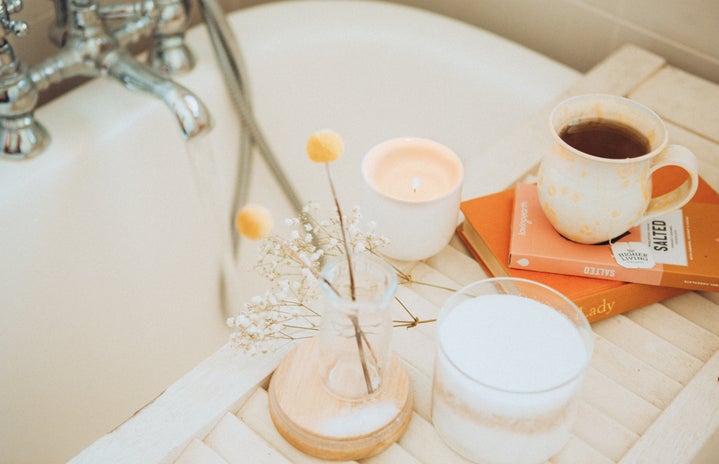True self-care is not a one-and-done activity where we take a temporary break from our life. It’s not all about lighting a couple of candles and taking a bubble bath. Yes, we all need to take breaks or have a “getaway,” but self-care isn’t always going to be this beautiful thing–sometimes it can be messy. Sometimes it involves recognizing the problem or part of life that you are trying to take a break from and addressing it.
Self-care can look different for every person, but the basic premise is the same. It’s about making your well-being a priority and then taking action to take care of yourself.

Self-Care can be setting boundaries
Self-care can look like limiting interactions with people, events and/or media that don’t bring you joy. Maybe you let your friend or partner know that you don’t like texting all throughout the day and would rather wait until the evening to catch up. Self-care can look like monitoring your screen time, setting limits for how long you spend in the social media world. Self-care can also simply be you saying “no” to certain things. You have to know what you will and will not accept in your life if you want to be able to take care of your well-being.
Self-care can be having better time management
If you are able to manage your time and be able to balance a workload with your social life, you may not be as stressed out where you feel the need to “take a break” constantly. That doesn’t mean that you shouldn’t spend time watching your favorite Netflix shows after a long day, but we have to be aware when it’s time to set aside time for other things that require our attention. On the flip side, self-care can also look like going out to that friend gathering after you’ve spent all week in the library. Remember that you don’t have to use up all your time trying to be productive. Self-care can look like managing your time so that after you work, you still have time to have some fun.
Self-Care can be developing daily habits
Incorporating certain activities every day can eventually turn into habits that can make you feel energized. Self-care can be about nourishing your body with great food, journaling your thoughts, planning out your day the night before or setting a proper bedtime. Again, self-care practices look different for everyone. Meditation isn’t for everyone, but maybe daily affirmations in the mirror will add to your mental. Some may enjoy heavy lifting, while others prefer a good run. Find out what works best for your well-being, but be intentional with the energy you give to these things. Good habits can help you reach certain goals, maintain your health and add to your overall wellness.
Self-care can be letting yourself feel
Cry. Laugh. Congratulate yourself for getting out of bed. Check-in with yourself. Be angry, be upset, be happy. Your emotions are valid. Self-care means not let anyone invalidate your feelings, including yourself. Just remember that your emotions don’t always justify a certain reaction or behavior, but that doesn’t mean you don’t have a right to feel. Choose your actions, but let yourself simply feel whatever it is you feel. You don’t have to “keep it together” 24/7, and you are not “too sensitive.” Let go of any performative behavior or pent-up feelings. Self-care is about being honest with yourself.
The most important relationship you can have is the one you have with yourself. Self-care involves showing up for you and putting you first. It is crucial, it is a necessity and it isn’t always pretty. Take care of yourself.


